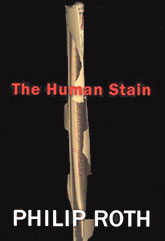The Human Stain
Critique • Quotes
 First edition
First editionFirst publication
2000
Literature form
Novel
Genres
Literary
Writing language
English
Author's country
United States
Length
Approx. 129,000 words
The secret lives of everyone
Of all Philip Roth's novels, The Human Stain comes closest to being a masterwork comparable to classic literature. Compared to most of his other works, which offer discrete slices of American life, the 2000 novel provides a wider-screen picture, a more expansive human story.
Don't get me wrong: The Human Stain is of a certain time (late-twentieth century), a certain place (New England, America), and specific issues particular to that time and place (political correctness, racial identity, post-traumatic stress from the Vietnam war).
But despite the story being told mostly by Roth's usual narrator, Nathan Zuckerman, a wider perspective is imparted. Or rather, several perspectives are imparted.
Roth, in his maturity, learned to empathize with all his characters. It's not just his narrator or subject who has a story of being uprooted. Everyone—even the assumed villains of the piece—has a story of struggling to fit in.
First and foremost, is Coleman Silk, a college dean who lost his position due to charges of racism over misunderstood remarks and who continues to be assailed by feminists over a misunderstood relationship he has with a working-class woman less than half his age. Silk is innocent of those charges, but his arrogant, tone-deaf responses make his situation all the worse.
And he has a deeper secret, gradually revealed to the reader. He has been living a lie his entire adult life, having cut himself off from his cultural background and passing for a person of a different race. What he has done is never justified, although it is understood.
A greater tragedy
But even his main persecutor, French intellectual Delphine Roux, gets her innings in a section that reveals her own loneliness and desperation at finding herself cut off from the academic mainstream in a small American college.
Silk's lover, Faunia Farley, has in her shorter lifespan experienced far greater tragedy than he, having lost her children and been abused by her former husband. She's the only person Silk lets in on his shameful secret and she accepts him. We're not exactly sure why, since she does privately rail against people being ashamed of their past. But she does seem in her inner life to be the character most settled with her own history and her fate.
More explosively we get the story of Faunia's ex-husband, murderous Vietnam veteran Les Farley, both from others and from his own inner torment. The stream-of-consciousness rants in Farley's voice are some of the most powerful and sympathetic writing Roth has done, demolishing the contention once and for all that Roth can write only in his own voice.
The book ends with narrator Zuckerman tracking the crazed ex-soldier to his favourite, secluded spot—a strangely satisfying unresolved conclusion to a restless novel in which everyone has double lives and no one finds his or her place.
Their interwoven stories unravel against a backdrop of 1990s politics, with news of the impeachment proceedings against Bill Clinton recurring—a background of real-life secrets and moralistic persecutions in American life.
Some readers may be disturbed that none of the human stories of The Human Stain reach any kind of "closure" (another term from that period). This is purposeful on Roth's part. Silk criticizes his literature students for fixing
on the conventionalized narrative, with its beginning, middle, and end—every experience, no matter how ambiguous, no matter how knotty or mysterious, must lend itself to this normalizing, conventionalizing, anchorman cliché. Any kid who says "closure" I flunk.
Roth resolutely resists tying up anything neatly. Far from being a "conventionalized narrative" from beginning to end, this story is all disconnected middle.
Characters' deepest secrets are never widely revealed. Causes of deaths are never discovered. Healing is never accomplished in expected fashion. There is no genuine closure in American life.
In other Roth works this might have been presented as the cry of his protagonist or Roth's alter ego, raging against the oblivious, narrow-minded folks who block and drive our hero to abstraction. But in The Human Stain it's recognized as a condition of us all.
— Eric
Critique • Quotes

